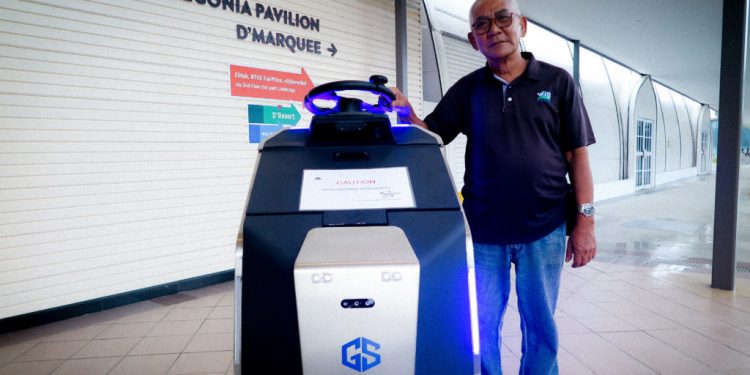With each droplet of sweat on his brow, a cleaner earns his keep. And muscle-power is his currency. The tools of his trade – the broom, mop, dirty rags, scrub and pail of soapy water.
But does his work always have to be labour intensive? Can anything be done to help cleaners like him become more productive and earn a better living?
The answer is yes.
Take the case of NTUC Club and Weishen Industrial Services for example. They have worked together to put in place initiatives to prove that cleaning work can be done more efficiently.
Having provided cleaning services to NTUC Club for the past three-and-a-half years, Weishen has worked with the management to pilot state-of-the-art cleaning technology at Downtown East since November 2017.
Autonomous Scrubber
Today, when you walk around the mall, you might come across a cleaning machine waltzing among shoppers with no human supervision. The first thing that comes to mind is the cleaner might perhaps have lost control of his equipment and is somewhere nearby frantically chasing after it.
Fortunately, that’s not the case.
Instead, the machine is called the Ecobot Scrub 75, a high-tech autonomous scrubber that can navigate itself around a mapped-out area, and turn dirty floor areas into something you would not mind eating off. Not that I would recommend that.
It also has an in-built obstacle avoidance technology, so you do not have to worry about getting run over while queuing to order your favourite Yocha drink.
http://https://www.youtube.com/watch?v=HF47xwx27rE
“The cleaning industry is labour-intensive. Many of the workers we employ are elderly, and we’ve noticed the high attrition rate. So, we’re always looking for ways to improve our services and at the same time retain our employees,” said Weishen Marketing Manager Angeline Yuen.
Before the Ecobot in November last year, cleaners at Downtown East had to use a manual scrubber to clean floors. Although the work was less labour-intensive than scrubbing by hand, a cleaner would still take around two hours to scrub a floor space the size of a basketball court.
Today, a cleaner would need just a few minutes to start the robot, key in the map of the floor area that needs cleaning and let the machine do the work for him. Doing so frees him up to attend to other more important tasks, and even take smoke rest breaks.
Enter the Smart Watch Technology
For many of us, keeping time is hard but keeping track of the 101 things we need to do can be harder.
Previously, when a cleaner at Downtown East had ad-hoc tasks like cleaning spillages, instructions from his superiors would often come to him through the form of text messages on his handphone.
But since Weishen piloted the use of a Smart Watch, it has helped both the management and cleaners speed up work processes. Should there be an urgent task that needs to be attended to, a cleaner would receive a job alert on his Smart Watch. From the alert, the cleaner would also know the exact location of his task from the Smart Watch’s location tracking system.
Check this video out to see how it works for yourself.
According to Alan Lee, Weishen operations manager at Downtown East, filing reports is also easier now as everything is stored in a digital database.
It takes him merely an hour to generate reports compared to three hours previously, where he had to manually key in information onto a system.
The Smart Watch also has a health monitoring feature where it can keep track of the heart rate of the wearer. Given that most of the cleaners at Downtown East are above the age of 50, this unique feature could potentially double-up as a life-saving device.
“It is not difficult to use the new equipment, even for an older person like me. I’ve been a cleaner for 15 years. From my experience, older workers like myself can do our jobs better with some guidance and training,” said Zainal Ismail, 71, a cleaner who has used both the Ecobot and the Smart Watch.
He added that implementing these technologies can help workers like him stay in the workforce for much longer.
Working Together
According to Weishen, NTUC Club has been very open to procuring new technology to make the lives of cleaners and waste management workers easier.
It was one of the seven organisations who signed an agreement with the National Environment Agency at the launch of the Industry Transformation Map for Environmental Services late last year. The partnership signified NTUC Club’s commitment to work with NEA, service providers and other stakeholders to collectively innovate and curate technology, solutions and innovations for the industry.
Beyond using Ecobot and Smart Watch, NTUC Club is also partnering Weishen to implement waste management technology such as smart bins and a food waste digestor at Downtown East.
NTUC Club CEO Lim Eng Lee said: “As part of a caring Labour Movement, we work with our service provider at Downtown East to implement technologies that allow for jobs to be completed quicker and manpower to be deployed more efficiently.
“Our cleaners are also upskilled in the process, and this ensures that they remain relevant in today’s progressively digital environment. When our cleaners feel valued, they take greater pride in their work, and this is a positive step towards raising the image of the waste management and cleaning industry.”

